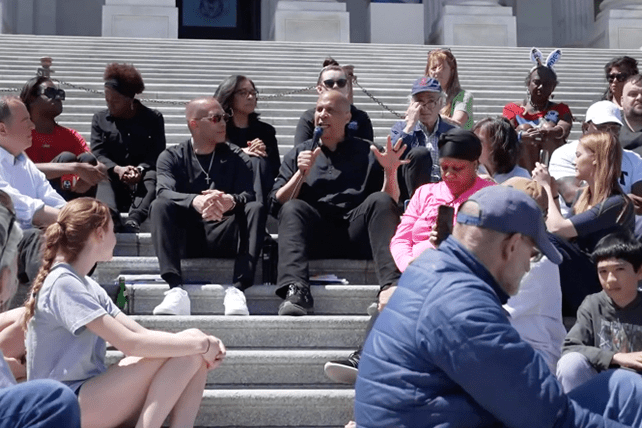WASHINGTON (RNS) — As the sun rose over the U.S. Capitol on the last Sunday in April, House Minority Leader Hakeem Jeffries, wearing a gold cross necklace, sat next to Sen. Cory Booker on the building’s stone steps. The two looked around quietly for a moment, awaiting confirmation that the livestream of their “sit-in” — a daylong effort designed to push back against the Republican-led budget proposal and actions by President Donald Trump’s administration — had begun.
After someone off-camera informed them the broadcast was live, both men immediately bowed their heads in prayer.
“Father God, we humble ourselves before you and before all who may watch today,” said Booker, the New Jersey Democrat who attends a Baptist church in Newark. After asking the Almighty for strength, he prayed that his words might “be of service at this crisis moment in American history.”
It was a preview of the next 12 hours, as the two prominent Democratic lawmakers and a slew of guests outlined a decidedly faith-forward argument against Republican leaders and the Trump administration. The pair discussed their own religious backgrounds, referred to liberation theology, read from the Bible and lauded what Booker called the transformative power of “faith traditions” — a phrase that came up no fewer than 45 times during the broadcast.
When the two weren’t talking, they passed a microphone to fellow lawmakers such as Georgia Sen. Raphael Warnock, who is also a pastor, and to various faith leaders, including activist and Yale Divinity School professor the Rev. William Barber II.
“If you pray at the opening session of the Senate or the House but then after you pray — P-R-A-Y — you pass a budget that preys — P-R-E-Y-S — on people that are vulnerable, then you just canceled out your P-R-A-Y,” Barber told the crowd as he stood next to Booker and Jeffries.
The sit-in, with its faith-filled language and its clergy participants, was part of an apparent strategic pivot by Democratic leaders desperate to find a foothold in a country where Republicans and conservatives dominate all three branches of government. As frustrated liberals pressure party leaders to counter the Trump administration, Democrats are taking some cues from the work of progressive religious activists — particularly Barber and his allies — who have been some of Trump’s loudest critics since his first administration.
“While many progressives, liberals and Democrats have been struggling to try and catch up to what the Trump administration is doing, people like William Barber and other folks on the religious left have had a kind of moral clarity about what’s going on for a long time,” Ruth Braunstein, a sociology professor at the University of Connecticut and director of the school’s Meanings of Democracy Lab, said in an interview. “So I think they’ve been able to respond more quickly.”
Faith-based pushback to Trump’s second presidency began the same day he was sworn in, when Barber preached a sermon challenging Trump’s incoming administration and issued a challenge to like-minded faithful, saying, “In this moment, we must remember whose we are and who we are.”
The next day, Trump sat for a sermon at the Washington National Cathedral, where the Rt. Rev. Mariann Budde, the Episcopal bishop of Washington, made headlines for asking the president to “have mercy” on transgender people, immigrants and refugees. A few days after that, a group of Quakers filed a lawsuit over the Trump administration’s decision to reduce restrictions on immigration enforcement raids at churches, the first in what would eventually become six faith-led lawsuits — including one led by the U.S. Conference of Catholic Bishops — that list dozens of religious organizations and even entire denominations as plaintiffs. Meanwhile, Jewish, Muslim and Christian organizations — including some evangelicals — have issued statements, staged vigils and participated in protests against the administration, especially its immigration and deportation policies.
The day after the sit-in, on April 28, Barber launched a series of weekly “Moral Monday” demonstrations on Capitol Hill that began with the pastor being arrested alongside two others while praying in the Capitol Rotunda against the GOP-led budget. A week later, five faith leaders allied with Barber were arrested in the Rotunda while doing the same.
“Let truth trouble the chambers of the Capitol,” Shane Claiborne, a longtime Christian activist, said in a prayer shortly before he was arrested in the Rotunda on Monday (May 5). “Let there be no peace where there is no justice. Let there be no comfort for those who legislate cruelty.”

